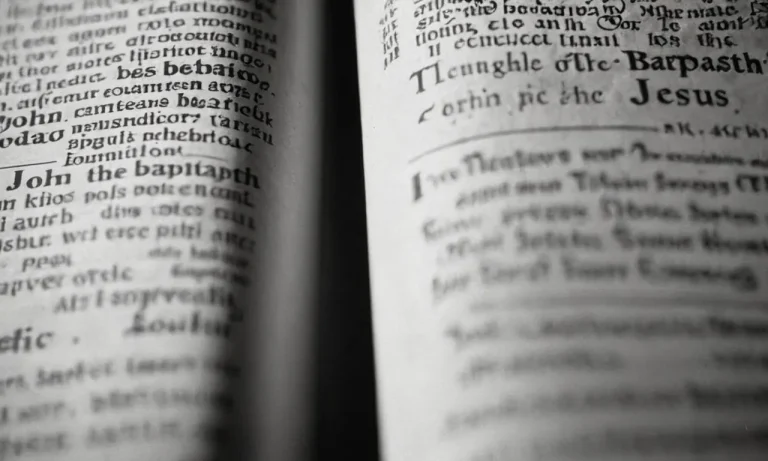What Is Forbidden In Judaism: A Comprehensive Guide
Judaism has many laws and customs that followers are expected to adhere to. Some of these laws forbid certain actions or behaviors in order to uphold religious values. If you’ve ever wondered ‘what is forbidden in Judaism?’, this comprehensive guide covers the major prohibitions.
In short, the main things forbidden in Judaism include: eating non-kosher foods, working on the Sabbath, worshipping idols, getting tattoos, cutting hair in certain ways, wearing clothing mixes of wool and linen, charging interest on loans, and more.
Forbidden Foods
Non-Kosher Meat and Seafood
One of the most well-known kosher dietary restrictions involves avoiding certain types of meat and seafood. According to Jewish law, land animals must chew their cud and have cloven hooves to be considered kosher. This means animals like pigs, rabbits,camels, and squirrels are not permitted.
Likewise, seafood must have fins and scales to be kosher, so shellfish like lobster, oysters, shrimp, and crab are forbidden. Only fish with fins and scales, like salmon, tuna, and trout can be eaten.
Jews who keep kosher will only eat meat that has been slaughtered according to ritual methods. This involves using a very sharp knife to cut the throat of the animal which causes a quick drop in blood pressure, rendering the animal insensible to pain.
All blood must be drained from the meat as consumption of blood is not allowed. After proper slaughter, the meat must be salted to remove any remaining blood.
Mixing Meat and Dairy
Another central aspect of keeping kosher relates to avoiding the mixing of meat and dairy products. This means keeping separate utensils, dishes, pots, pans, and other cooking implements for meat and for dairy. It also prohibits preparing, cooking, or consuming them together.
For example, a kosher-observant person would not eat a cheeseburger, put milk or creamer in coffee after eating meat, or use the same toaster for meat and dairy breads.
The origin of this restriction comes from the biblical injunction against “boiling a kid in its mother’s milk” which appears three times in the Torah. To avoid any confusion, kosher Jews simply keep all meat and dairy separate.
Many have distinct sections in their kitchens for meat and dairy, use color-coding, or wait for a passage of time after eating meat before consuming dairy products.
Insects and Shellfish
In addition to land animals and seafood, insects are also prohibited according to kosher dietary law. This includes locusts, crickets, worms, and other crawling critters. The Torah identifies four specific species of locust that are permitted, but all other insects are forbidden.
Likewise, all shellfish without fins and scales are prohibited. This includes clams, oysters, mussels, shrimp, lobster, crayfish, crab, scallops, and others. Some kosher-keeping Jews will eat fish sticks or other reconstituted seafood since the original source is pulverized beyond recognition.
The prohibition against eating insects and shellfish likely originated from the fact that such creatures were seen as dirty or disease-carrying in ancient times. By avoiding them, kosher Jews aimed to maintain both spiritual and physical purity.
Sabbath Restrictions
Categories of Forbidden Work
On the Sabbath, which lasts from Friday evening to Saturday evening, Orthodox Jews are prohibited from engaging in 39 categories of work, known as melachot. These activities mirror the types of work involved in constructing the Tabernacle as outlined in the Torah.
The 39 categories include planting, plowing, reaping, binding sheaves, threshing, winnowing, selecting, grinding, sifting, kneading, baking, shearing wool, washing wool, beating wool, dyeing wool, spinning, weaving, making two loops, weaving two threads, separating two threads, tying, untying, sewing stitches, tearing, trapping, slaughtering, flaying, treating hides, scraping pelts, marking hides, cutting hides to shape, writing two or more letters, erasing two or more letters, building, demolishing, extinguishing a fire, kindling a fire, striking with a hammer, and carrying objects between private and public domains.
Engaging in these melachot is considered a major transgression. However, certain exceptions are made for activities related to health, safety, and other human needs. For example, driving a car is generally prohibited on the Sabbath, but driving to the hospital for urgent medical care would be permitted.
Use of Electricity and Cars
Orthodox Judaism prohibits the use of electricity on the Sabbath because it involves kindling or extinguishing a fire, one of the 39 forbidden categories of work. Turning lights on or off, using electrical appliances, watching television, making phone calls, driving a vehicle, and other acts involving electricity are forbidden.
However, some exceptions may be made for security systems, medical devices, Shabbat elevators, and other necessities. According to orthodox interpretations, activities like pressing an elevator button constitute “completing a circuit” and are therefore prohibited.
Driving any vehicle with an internal combustion engine is completely forbidden, as it involves igniting fires to power the engine. Electric vehicles are also banned, as they rely on electricity. However, in cases of pikuach nefesh, or the preservation of human life, driving a car to seek emergency medical care would be permitted.
Some orthodox authorities have debated whether driving electric cars could be permitted if necessary for the elderly or disabled, but there is no consensus.
According to a 2021 Pew Research survey, 8% of Orthodox Jews report driving a car on the Sabbath, compared to 52% of Conservative Jews and 65% of Reform Jews. This highlights the diversity in observance and interpretation on this issue across different Jewish denominations.
Handling Money
Commercial transactions are banned on the Sabbath as they violate the prohibition against certain types of work. This means that Orthodox Jews cannot buy, sell, trade, or even discuss business matters during this time. Handling money in any way, including touching coins or bills, is forbidden.
Stores owned by observant Jews will be closed for the duration of the Sabbath.
According to orthodox interpretations, acts like withdrawing money from an ATM would violate multiple Sabbath restrictions – completing an electrical circuit by pressing buttons, engaging in a commercial transaction by accessing bank accounts and handling money, and potentially recording the transaction in the bank’s accounting books.
Therefore, financial activities are completely avoided.
There are rabbinic debates around whether using pre-paid cards could be permitted in certain cases of need, as the money is not being exchanged on the Sabbath itself. However, most Orthodox Jews avoid any monetary transactions to eliminate violation risks.
According to a 2016 Pew survey, 95% of Orthodox Israeli Jews said they do not handle money on the Sabbath.
Idol Worship and False Gods
Idol worship and false gods are strictly prohibited in Judaism. The Jewish faith is based on the belief in one true God, the creator of the universe. The first two of the Ten Commandments directly address this:
- “I am the Lord your God, who brought you out of the land of Egypt, out of the house of slavery. You shall have no other gods before Me.” (Exodus 20:2-3)
- “You shall not make for yourself a graven image, nor any manner of likeness, of anything that is in heaven above, that is on the earth beneath, or that is in the water below the earth. You shall not bow down to them or serve them.” (Exodus 20:4-5)
These commandments firmly establish that God is the only deity worthy of worship. Making idols, bowing down to statues, or praying to any god other than the God of Israel is completely forbidden.
The Torah warns against idolatry numerous times. For example, Deuteronomy 4:15-19 cautions:
“Since you saw no form when the Lord spoke to you at Horeb out of the fire, take care and watch yourselves closely, so that you do not act corruptly by making an idol for yourselves, in the form of any figure—the likeness of male or female, the likeness of any animal that is on the earth, the likeness of any winged bird that flies in the air, the likeness of anything that creeps on the ground, the likeness of any fish that is in the water under the earth.
“
Throughout history, the Jewish people have strictly avoided worshipping idols or false gods. While their pagan neighbors worshipped a pantheon of gods and built temples with idol statues, the ancient Israelites destroyed pagan altars and removed idols from the land (see 2 Kings 18:4).
Reasons for the Prohibition
There are several reasons why idolatry is so emphatically forbidden in Judaism:
- It is a rejection of God’s absolute sovereignty as the one true deity.
- Idols are human creations that cannot help or save anyone.
- Idol worship often involves immoral pagan rituals.
- It leads to the dilution of monotheism and integrating pagan beliefs.
Jewish sages considered idolatry one of the worst sins because it struck at the heart of the covenant with God. Turning to false gods compromised the special relationship between God and Israel. Even symbolic idolatry in the form of art or literature was unacceptable.
What Constitutes Idolatry?
Idolatry includes any of the following practices:
- Praying to gods, angels, celestial bodies, or spirits other than God
- Creating physical idols or images of gods for veneration
- Building temples, shrines, or altars to other deities
- Ritually worshipping natural phenomena like the sun, moon, stars, or earth
- Practicing magic, divination, or occult rituals prohibited by the Torah
- Consuming offerings made to idols
Even activities that seem innocuous like yoga, horoscopes, or fortune-telling are forbidden if they involve worship or belief in non-Jewish gods or spirits.
However, non-idolatrous forms of art, literature, philosophy, appreciation of nature, and moral truths of other faiths are permitted. Judaism recognizes truth and wisdom in many sources, as long as God retains His position as the only deity worthy of worship.
Modern Applications
While active pagan idol worship is rare today, the prohibition still has modern implications:
- Revering human leaders, wealth, or philosophies as supreme rather than God is a form of idolatry.
- Believing in dualistic theologies that posit forces like Satan as equal to God violates monotheism.
- Pursuing fame, pleasure, or power as life’s ultimate pursuit constitutes idolatry.
- Upholding ideology, politics, or nationalism as worthy of worship falls under this prohibition.
Hair and Clothing Rules
Cutting Hair
In Orthodox Judaism, men are prohibited from cutting the hair around their temples, also known as sideburns or peyot. This tradition comes from Leviticus 19:27 which states: “You shall not round off the pe’ah of your head, nor shall you destroy the edge of your beard.”
The peyot serve as a physical reminder to follow the commandments of God. Though not explicitly stated in the Torah, some Orthodox Jewish men refrain from cutting their beards as well. For married women, shaving one’s head is prohibited.
Covering one’s hair after marriage is a sign of modesty and respect for one’s husband.
Wool and Linen Clothing
The Torah prohibits wearing a garment containing both wool and linen together in Leviticus 19:19 and Deuteronomy 22:11. This law is known as shatnez. The reason behind this commandment is not entirely clear, but it serves as a reminder to keep different realms of life separate and distinct.
Many observant Jews carefully inspect clothing labels before purchase and have their clothes checked by experts annually before Passover to ensure they do not accidentally violate this law. Wool and linen blends are common in modern clothing, so vigilance is required.
Some posit this law was for practical reasons, as wool and linen fibers require different treatments in washing and wear. Others believe it reinforces spiritual concepts.
Wearing Opposite Gender Clothing
Clothing rules in Orthodox Judaism aim to maintain modesty and distinction between genders. Deuteronomy 22:5 states: “A woman shall not wear man’s clothing, nor shall a man put on a woman’s clothing; for whoever does these things is an abomination to the Lord your God.”
Wearing clothing associated with the opposite gender is prohibited. For men, this includes skirts, dresses, blouses, and feminine accessories. For women, this includes neckties, pants, or suits. Even wearing unisex clothes like jeans is controversial for women in some communities.
These rules apply in both public and private settings. Many see this as a way of preserving tradition and sacredness around gender in Judaism.
Forbidden Personal Practices
Tattoos
Getting a tattoo is considered taboo in traditional Judaism. The Torah states “You shall not make gashes in your flesh for the dead, or incise any marks on yourselves” (Leviticus 19:28). This verse is interpreted as a prohibition against tattoos.
There are a few main reasons why tattoos are frowned upon:
- Tattoos alter God’s creation – The body is seen as a holy vessel, so intentionally damaging it is seen as disrespectful.
- Tattoos were associated with idol worship – In Biblical times, markings on the skin were sometimes related to pagan rituals and idolatry.
- Tattoos are permanent – Judaism emphasizes change and growth, so permanently altering oneself goes against this.
However, tattoos are not completely forbidden. Some more liberal Jewish thinkers believe tattoos are permissible if not done for idolatrous reasons. But overall, most observant Jews avoid tattoos to follow traditional interpretations of the Torah.
Charging Interest
Charging interest (known as ribbit in Hebrew) for loans is prohibited according to the Torah. Several verses forbid Jews from charging interest to fellow Jews (Exodus 22:24, Leviticus 25:36-37, Deuteronomy 23:20). This comes from the value of helping others in need.
However, charging interest is permitted in dealings with non-Jews.
Over time, Jews found creative ways around the interest ban when dealing with other Jews. One example is “heter iska”, which structures the loan as an investment with the lender sharing risk and reward.
Many modern rabbis still discourage charging interest but recognize its necessity in the modern world.
Some key principles behind the interest prohibition include:
- Protecting the vulnerable from exploitation
- Encouraging donations and interest-free loans where possible
- Fostering good will and unity within the Jewish community
So while the typical business loan with interest is permitted today between Jews, the ethical spirit behind the law remains relevant. Jews are encouraged to offer assistance to those in need whenever possible.
Conclusion
Judaism’s religious laws decree that followers must avoid non-kosher foods, working on the Sabbath, idol worship, and other major prohibitions. While these forbidden practices may seem restrictive to outsiders, adherents view them as key to upholding their covenantal relationship with God.








